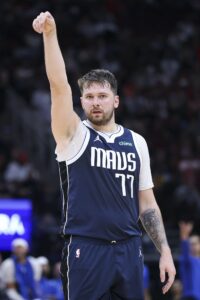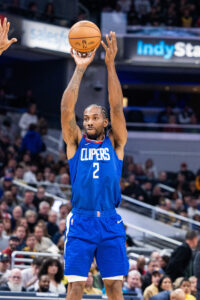Over the past couple weeks, we’ve been examining projections for all 30 NBA teams for the 2024/25 season, publishing polls asking how many games each club will win. With the help of lines from professional oddsmakers, we’ve had you vote on whether each team will go over or under a given win total, from the Celtics (58.5) all the way through to the Nets (19.5).
Here are the full results of those votes:
Eastern Conference
 Boston Celtics (58.5 wins): Over (69.7%)
Boston Celtics (58.5 wins): Over (69.7%)- New York Knicks (53.5 wins): Over (58.8%)
- Philadelphia 76ers (52.5 wins): Under (51.7%)
- Toronto Raptors (30.5 wins): Under (58.7%)
- Brooklyn Nets (19.5 wins): Over (54.3%)
- Milwaukee Bucks (50.5 wins): Over (63.2%)
- Cleveland Cavaliers (48.5 wins): Under (51.6%)
- Indiana Pacers (47.5 wins): Over (57.2%)
- Chicago Bulls (28.5 wins): Under (61.9%)
- Detroit Pistons (24.5 wins): Over (60.2%)
- Orlando Magic (47.5 wins): Over (57.1%)
- Miami Heat (44.5 wins): Under (63.1%)
- Atlanta Hawks (35.5 wins): Under (66.4%)
- Charlotte Hornets (29.5 wins): Under (63.1%)
- Washington Wizards (20.5 wins): Under (56.6%)
Western Conference
- Oklahoma City Thunder (56.5 wins): Over (68.1%)
- Minnesota Timberwolves (52.5 wins): Over (65.2%)
- Denver Nuggets (51.5 wins): Over (54.3%)
- Utah Jazz (29.5 wins): Under (60.1%)
- Portland Trail Blazers (22.5 wins): Under (54.7%)
- Phoenix Suns (50.5 wins): Over (57.6%)
- Sacramento Kings (47.5 wins): Over (62.5%)
- Golden State Warriors (44.5 wins): Under (54.4%)
- Los Angeles Lakers (43.5 wins): Under (51.9%)
- Los Angeles Clippers (39.5 wins): Under (50.8%)
- Dallas Mavericks (49.5 wins): Over (78.0%)
- Memphis Grizzlies (47.5 wins): Under (65.6%)
- New Orleans Pelicans (46.5 wins): Under (60.6%)
- Houston Rockets (43.5 wins): Under (51.4%)
- San Antonio Spurs (36.5 wins): Under (52.9%)
In total, our poll respondents favored 13 overs and 17 unders, which is an interesting divide. In past years, there have been more “over” votes than “under” votes, but it appears our readers are less willing to buy into preseason optimism for certain clubs this time around. The Southeast and Southwest fared particularly poorly in this regard, with eight of the 10 votes in those divisions favoring the under.
These were the five “over” bets that received the largest vote shares:
 Dallas Mavericks (49.5 wins): 78.0%
Dallas Mavericks (49.5 wins): 78.0%- Boston Celtics (58.5 wins): 69.7%
- Oklahoma City Thunder (56.5 wins): 68.1%
- Minnesota Timberwolves (52.5 wins): 65.2%
- Milwaukee Bucks (50.5 wins): 63.2%
The top four teams here all have something in common: Dallas (50 wins in 2023/24), Boston (64), Oklahoma City (57), and Minnesota (56) would all go “over” if they simply replicate their records from last season. And in most cases, that looks like a realistic goal — the Mavericks and Thunder arguably improved as a result of their offseason moves, while Boston’s roster looks pretty similar and Minnesota’s losses (including Kyle Anderson and Monte Morris) may not be enough to warrant a four-game drop.
Still, winning 57 games in the competitive West will be no easy feat for Oklahoma City, and winning 59 is a grind even for the best team in a weak conference — the ’23/24 Celtics were the first Eastern Conference club to win 59+ since Milwaukee racked up 60 victories in ’18/19.
Speaking of the Bucks, our voters appear confident in their ability to bounce back after a disappointing season that saw them experience some growing pains following last September’s Damian Lillard blockbuster and make an in-season coaching change. A full offseason and training camp with Lillard and head coach Doc Rivers is a reason for optimism in Milwaukee.
Here are the five “under” bets that received the largest vote shares:
- Atlanta Hawks (35.5 wins): 66.4%
- Memphis Grizzlies (47.5 wins): 65.6%
- Charlotte Hornets (29.5 wins): 63.1%
- Miami Heat (44.5 wins): 63.1%
- Chicago Bulls (28.5 wins): 61.9%
The Hawks only won 36 games last season, so it’s perhaps no surprise that our voters aren’t enthusiastic about their odds of matching that total again in 2024/25 after trading away Dejounte Murray. I do think the offense could fit together better without Trae Young having to share ball-handling duties with Murray, but for the Hawks to match or exceed last year’s win total, they’ll likely need young players like Jalen Johnson and Dyson Daniels to take significant steps forward.
The Grizzlies are a fascinating case. They went just 27-55 last season, but were the NBA’s most injury-plagued team and will have several key players – led by Ja Morant – back this fall. This year’s roster isn’t quite the same as the one that won 56 games in 2021/22 and 51 in ’22/23, but it’s close enough that I was a little surprised not to see more votes for the “over.”
The Hornets are a poor man’s version of Memphis, with oddsmakers projecting a nice bump on last year’s 21-61 record with starters like LaMelo Ball and Mark Williams once again healthy. Our voters aren’t so sure.
The Heat went 46-36 last year, but lost Caleb Martin and didn’t add any major pieces. Jimmy Butler‘s contract situation is also a question mark — it’s not out of the question that he could be a trade candidate at February’s deadline if the first half doesn’t go well in Miami.
The Bulls won 39 games last season but lost DeMar DeRozan and Alex Caruso over the offseason and are expected to seek takers for Zach LaVine and Nikola Vucevic too. If they turn into second-half tankers, their under looks like a pretty safe bet.
Here are the five picks that were closest to 50/50:
 Los Angeles Clippers (39.5 wins): Under (50.8%)
Los Angeles Clippers (39.5 wins): Under (50.8%)- Houston Rockets (43.5 wins): Under (51.4%)
- Cleveland Cavaliers (48.5 wins): Under (51.6%)
- Philadelphia 76ers (52.5 wins): Under (51.7%)
- Los Angeles Lakers (43.5 wins): Under (51.9%)
The fact that all five of the closest votes favored the “under” helps explain why we ended up with 17 unders overall.
The Clippers and Sixers are the most interesting cases here, since subtracting Paul George in Los Angeles and adding him in Philadelphia will make both teams look a whole lot different. It’s hard to get a feel of what both clubs might look like until we see them in action.
The Rockets, Cavaliers, and Lakers, on the other hand, are all pretty similar to last year’s versions. Oddsmakers are projecting a small step forward for the young Rockets (who went 41-41 last year), a step back for the veteran Lakers (who went 47-35), and essentially the same season for Cleveland (48-34).
What do you think of our picks in general? Are there any results above that you strongly disagree with? Did you make any over or under votes within the last couple weeks that you’re second-guessing now? Jump into our comment section below and weigh in with your thoughts!
You mention that you referenced “lines” from professional oddsmakers, but, respectfully, your projections are dramatically different from any line that Internet bettors can track or that Vegas offers. Perhaps your calculations are based on deriving wins-losses from these “lines”, but your calculations were off? The below is based on the published odds at ESPN, which reflects Vegas. (Annoyingly, as always, Lakers are expected to benefit from in-season personnel movement that other teams are not.)
Team,Odds,Expected Wins,Expected Losses
1. Boston Celtics (BOS),+325,67,15
2. Oklahoma City Thunder (OKC),+650,65,17
3. Philadelphia 76ers (PHI),+750,63,19
4. Denver Nuggets (DEN),+800,62,20
5. New York Knicks (NY),+800,60,22
6. Dallas Mavericks (DAL),+1000,58,24
7. Minnesota Timberwolves (MIN),+1100,56,26
8. Milwaukee Bucks (MIL),+1500,54,28
9. Los Angeles Lakers (LAL),+3000,53,29
10. Phoenix Suns (PHX),+3000,51,31
11. Golden State Warriors (GS),+4000,49,33
12. Los Angeles Clippers (LAC),+4000,47,35
13. Miami Heat (MIA),+4000,46,36
14. Sacramento Kings (SAC),+4000,44,38
15. Memphis Grizzlies (MEM),+4000,42,40
16. New Orleans Pelicans (NO),+5000,40,42
17. Cleveland Cavaliers (CLE),+5000,38,44
18. Indiana Pacers (IND),+5000,37,45
19. Orlando Magic (ORL),+5000,35,47
20. San Antonio Spurs (SA),+10000,33,49
21. Houston Rockets (HOU),+15000,31,51
22. Atlanta Hawks (ATL),+20000,29,53
23. Chicago Bulls (CHI),+50000,28,54
24. Toronto Raptors (TOR),+50000,26,56
25. Detroit Pistons (DET),+100000,24,58
26. Brooklyn Nets (BKN),+100000,22,60
27. Portland Trail Blazers (POR),+100000,20,62
28. Utah Jazz (UTAH),+100000,19,63
29. Washington Wizards (WSH),+100000,17,65
30. Charlotte Hornets (CHA),+100000,15,67
Each of the divisional posts mentioned that we were primarily using BetOnline and Bovada. I also used FanDuel in instances where I wanted a third source. Here are the links to those odds:
link to sports.betonline.ag
link to bovada.lv
link to sportsbook.fanduel.com
These three sites all have nearly identical over/under bets available. Not sure where your numbers are coming from, but the over/unders available on ESPN BET look awfully similar to the three sites above: link to espnbet.com
Luke, I see the reason for the confusion: most of the comments from users on this site assume that the wins are projected wins for each team based, not an over-under on a betting line. Outside of a betting context, such as on this site, O/U’s can look strange, so you may want to consider whether there’s a better measure for this site. (Or maybe not, so excuse me in advance if this is presumptous.)
For example, the Celtics, at +325, project mathematically to win 67 games, whereas the over-under projects only 58 games. The best team in the league rarely wins less than 60 games. The Celtics won 65 games last year. Any bookmaker will tell you that a +325 translates *mathematically* to mid-60’s in wins. If you don’t think the O/U’s you listed look “off”, use them to create your end-of-season standings. You’ll notice that the win totals for the top teams look way, way too low.
Oddsmakers base O/U’s not only on statistical projections but also to balance betting action on both sides, which reduces their risk, which is why O/U projections get pushed to the mean.
If you look at the table I provided from ESPN, the “odds” (to win the Championship) are, basically, the same as you’ll find anywhere. ESPN also provides O/U’s, which are the same as the ones from the sites you list. However, the win-loss numbers I provided are mathematically derived from the odds (converted to implied probability, sum them, and assign normalized probabilities to each team), unlike O/U’s, which are also shaped by the bookmaker’s economic interests.
I believe that commenters on this (non-betting) site want to see the projected W-L for all teams at once, in one place, and the numbers should “look right”. When you list O-U’s together that way, they don’t. (And they’re not strictly accurate: O-U’s for all teams rarely add up to 1,230 wins.) Before the season, it would be very cool for all commenters to be able to create a ranked list of teams with their own projections.
Cheers.
I appreciate the thoughts, but I think we’ll respectfully have to agree to disagree on which projections look more “right.” To me, the idea that five teams could win 60+ games in a season (which has never happened) is far more unrealistic than the best team in the league winning 58 (which happened two years ago).
I also fundamentally disagree that converting championship odds to a presumed win-loss record is the most accurate way to get a regular season projection, since championship odds take into account several factors beyond regular season record (including which teams’ rosters are more “built” for the playoffs, which teams have players with championship experience, etc.)
Like Vegas, my goal is to try to “split” the voting action here, since that makes for a more interesting result. If I put the Celtics over/under at 67 or the Sixers at 63 or the Lakers at 53, I suspect 90% of the voters would take the under. Ditto for the over with the Cavs at 38 or the Magic at 35.
>
I also fundamentally disagree that converting championship odds to a presumed win-loss record is the most accurate way to get a regular season projection, since championship odds take into account several factors beyond regular season record (including which teams’ rosters are more “built” for the playoffs, which teams have players with championship experience, etc.)
>
Luke, I appreciate your thoughtful response.
First, a critical factor that you may be overlooking: 2025-26 has historically “imbalanced” pre-season odds because there are an historically large number of tanking teams. thus the good teams will win an unprecedented number of games, especially in the East.
Consider that we haven’t seen a single team with preseason odds as bad as +100000 since 2019. This year there are 6! such teams (Some bookmakers have only 5, but several have 7 teams.) +100000 is a code for “tank”. At least 4, (for some bookmakers, 5) of these teams are in the East. The Celtics, 76ers, and Knicks are playing about 30% of their games against teams that don’t care about winning, inflating their wins
link to basketball-reference.com
I won’t be disappointed if you don’t read on, but:
1. Agree: if your goal is to “split” the voting action, using O/U’s instead of mathematically-derived projections will generate more votes.
2. Agree: The public odds for winning the championship, as opposed to those for finishing with the best record in the regular season, lead to a narrower variance between best and worst teams. However it’s not by as much as you suggest. For example, using the in-season only odds, the Celtics would win 64.5 games, as opposed to 67,
3. Agree. As you say, 5 teams over 60 wins feels like too many, but it you use the in-season only odds, the Nugget and Knicks would both drop to under 60.
3. Disagree: Respectfully, the odds-based derived projections are provably more predictive than the O-U’s — not only mathematically, but, given the last 15 years of data, the derived odds are significantly better than O-U’s at predicting final W-L results. A number of academic studies have been done on this with the goal of identifying the effect of the oddsmaker’s economic interests.
Again, appreciate the feedback. I remain skeptical about many of the projections you listed in your first comment, but it’ll be interesting to check back in the spring to see how it all plays out — I always publish a post in April looking back at these votes when the regular season results are in.
Luke , not sure whether the topic interests you, but the “NBA has a tanking problem” storyline has legs.
No professional sport, including in Europe, has ever had to deal with anything on the scale of 1/5 of its teams not doing their best. On average, about 1/6 games will be non-competitive. It’s not just the fans being screwed. The tickets don’t sell, and TV networks and advertisers don’t want these games.
Silver has to make significant structural changes sooner than later.